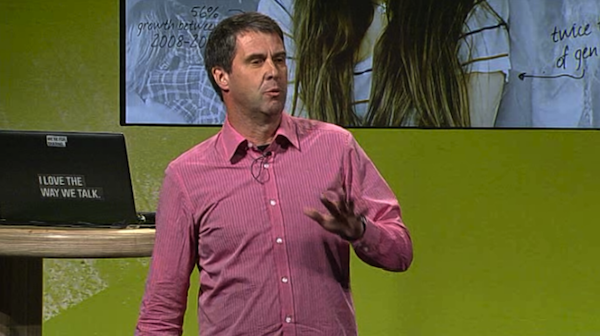
J Allard and Robbie Bach are out, in doomed Microsoft Entertainment & Devices shake-up
Today, Microsoft doomed its Entertainment and Devices division to failure, in a sudden shake-up removing key creative leaders. Timing is simply terrible. Microsoft is engaged in a pitched battle with Apple and Google in several strategic entertainment and mobile categories. It's like Microsoft changed generals on the eve of a major and quite possibly war-outcome-defining engagement.
Out are Robbie Bach, president of the Entertainment and Devices division, and J Allard, Microsoft's Apple Jony Ive wannabe. In expanded roles: Andrew Lees, senior veep of the Mobile Communications Business, and Don Mattrick, senior veep of E&D's Interactive Entertainment Business. Bach will stay on through autumn in an advisory role, but the move leaves one of Microsoft's five major business units without a president. Allard is leaving. Period. Although Microsoft claims he will remain in an advisory role to CEO Steve Ballmer.

Adobe Reader faces its first genuine competition from a free alternative
Download Nitro PDF Reader 1.1.1.13 from Fileforum now.
Even today, we tend to use the phrase "Adobe PDF" when referring to the Portable Document Format, despite the fact that Adobe released its ownership of the standard into the open community in 2008. The typical opinion has been that releasing PDF as ISO/IEC 32000-1 was more of a symbolic gesture, but that Acrobat would always remain the principal application for creating PDF files.

Wal-Mart cuts iPhone 3G S price in half, continues Apple's one-year smartphone life cycle
The life cycle of smartphones has reached the point where a single year means the difference between cutting edge and cutout bin, and Apple looks to be following -- if not driving -- that trend.
When the iPhone 3G S debuted last June, the price of the iPhone 3G was slashed to $99. Today, one year later, we're seeing the same thing happen to the 3G S.

Toward a 'Fourth Way:' Congress prepares to completely overhaul telecom law
In an acknowledgment that the regulatory compromise proposed earlier this month by Federal Communications Commission Chairman Julius Genachowski, at the very least, may be inadequate for a long-term resolution to the debate over who or what gets to regulate the Internet in the US, Democratic leaders of both houses of Congress said today they will set the wheels in motion, starting now, for a potential rewriting of all US telecommunications law.
Such an act could, if successful -- and if it can be accomplished in our lifetimes -- finally codify just what Internet communications is and what it does, not with respect to or in comparison with the telephone or the public airwaves. And it could very well result in an entirely new regulatory structure that's not the FCC as we know it today, but may yet have the Congressional authority and mandate to regulate network neutrality in some form.

To match the Nexus One's speedy 'FroYo' update, T-Mobile rolls out faster network
Early this year, mobile network operator T-Mobile USA announced it would complete its HSPA+ network upgrade by mid-2010, bringing a theoretical maximum downlink speed of 21 Megabits per second to its entire 3G footprint.
After testing the upgraded network technology in Philadelphia for the last year, T-Mobile today announced that the enhancement has gone live in the "Northeastern U.S," which includes the New York City metropolitan area, New Jersey and Long Island, upstate New York (Albany, Buffalo, Rochester and Syracuse,) Connecticut (Hartford, New Haven, Milford and Stamford,) and Providence, R.I. Additionally, the HSPA+ network has gone live in Memphis, Tennessee and Las Vegas Nevada.
![Seagate's cross-section depiction of its new Momentus XT hybrid SSD/HDD. [Courtesy Seagate]](https://betanews.com/wp-content/uploads/media/50/5024.jpg)
Seagate tries a new hybrid solid-state HDD, this time without Microsoft's help
The latest hybrid notebook storage device announced today by Seagate Technology, the 2.5-inch form factor Momentus XT, promises radical performance improvements from every hybrid drive that has come before. Seagate says it can now offer this performance by literally divorcing the drive from, and breaking all connections with, the Windows-based technology that catalyzed the company's entry into the hybrid SSD business to begin with.
Back in 2005, Seagate appeared to stand firm against what many believed to be the coming wave of solid-state storage technology, made feasible by more reliable flash RAM technology whose costs were plummeting and form factors shrinking. Seagate said at the time that flash wasn't exactly as reliable as it seemed on paper compared to magnetic disks, in which the company was solidly invested.

Apple's five stages of Google grieving
Grief typically follows any breakup, whether by the living separating or death taking one away. Apple's response to the disillusion of its Google relationship is near textbook case of the five stages of grief: denial, anger, bargaining, depression and acceptance. Apple is slowly coming to terms with life after Google, and like any grieving the process hasn't been easy.
Denial. Two years before Apple released iPhone, Google bought Android. From the August 2005 acquisition, it was clear that Google would make mobile a priority, and surely that a phone would follow. "We did not enter the search business. They entered the phone business," Apple CEO Steve Jobs told employees during a March meeting. Google released Android OS about 18 months after iPhone launched in June 2007, but the product was foreseeable. Jobs' retort is classic denial behavior.

Zuckerberg: Facebook will respect the privacy of those who really prefer it
If a user would rather that Facebook not share her personal information with other services unknowingly, then there should be a simple switch that turns off Facebook's ability to do that. This was the message delivered by Facebook CEO Mark Zuckerberg, in an op-ed piece published in Sunday's Washington Post.
"Facebook has been growing quickly. It has become a community of more than 400 million people in just a few years," Zuckerberg wrote. "It's a challenge to keep that many people satisfied over time, so we move quickly to serve that community with new ways to connect with the social Web and each other. Sometimes we move too fast -- and after listening to recent concerns, we're responding."

I left a lightbulb on for one year straight, or: Why LED bulbs are about to change your life
I have left a lightbulb turned on for one year straight and I'm finally ready to talk about it.
Three years ago, I started tinkering with Light Emitting Diodes (LEDs). They're small, can be purchased for relatively little money, and require very little skill as an electrician to turn into fun toys. So little skill, in fact, that you can tape them to a button cell battery and they light up.

AT&T to raise two-year termination fee by 86% on iPhones, smartphones
In a cautiously worded notice to customers this afternoon, AT&T advised that it will be raising its early termination fee (ETF) for wireless service for smartphones and netbooks, evidently including Apple's iPhone. Beginning June 1, the base rate for ETFs from two-year service agreements will be raised from $175 minus $5 per month of tenure, to $325 minus $10 per month.
"One of the ways we do this is to offer you the industry's leading wireless handsets below their full retail price when you sign a two-year service agreement," reads AT&T's notice. "In the event you wish to cancel service before your two-year agreement expires, you agree to pay a prorated early termination fee (ETF) as an alternative way to complete your agreement."

HP extends massive battery recall for overheating notebooks
The U.S. Consumer Product Safety Commission put out a bulletin this afternoon extending last year's recall of HP and Compaq Li-Ion notebook batteries that were prone to overheating.
The recall in May of last year included 70,000 potentially defective batteries, and today that has been extended to approximately 54,000 more.

Google + AdMob may have reduced competition in 2009, but not today, says FTC
Members of the US Federal Trade Commission said indeed, they were concerned that the acquisition of mobile ad platform AdMob by global Web advertising leader Google, announced last November, would result in the elimination of at least one competitive relationship in the marketplace.
But commissioners literally credited Apple with filling that gap, in a 5-0 decision today in favor of the acquisition that might not have ended up that way had Apple not decided to launch its own iAd platform last month.

Patent pool may be in the works for 'free' VP8 codec
A spokesperson for MPEG LA, the licensing provider for the H.264/AVC portfolio, confirmed to Betanews this afternoon that it is actively considering taking the first step in the process of collecting revenue from the distributors of the video codec that Google released under a free and open source license on Wednesday.
As MPEG LA CEO Larry Horn first told The Wall Street Journal's John Paczkowski, the licensor is open to the possibility of the creation of a patent pool for collecting royalties pertaining to the essential patents used by the VP8 codec, part of the open source multimedia technology that Google has dubbed WebM.

Are you a Mac, or are you a PC?
The year 2006 will be remembered as transformative. Google bought the nearly year-old YouTube. Facebook opened to the general public, and Twitter launched. In May, Apple debuted the "Get a Mac" advertising campaign, which is one of the most memorable and quite possibly the most definitive for high-tech marketing -- at least in this century. "Get a Mac" is no more. Apple now redirects to Why You'll Love the Mac," which is merely informational. Four years of commercials are gone, too, although some will remain on YouTube until Apple demands they be pulled. That's already started.
As I've asserted before, most of the popular social media services taken for granted today started during or after 2006. Even the iPhone came later. Something else happened in 2006, which gave Apple unexpected tailwind for Mac sales: Microsoft bungled Windows Vista's launch. The company missed the holiday sales period, launching Vista for businesses at the end of November, but not for consumers until late January 2007. Apple's "Get a Mac" marketing would shift from generally knocking Windows PCs to direct attacks on Windows Vista.

Straight from Sony Chairman Sir Howard Stringer: Here's why Google TV is a huge deal for Sony
Sony Corp. Chairman Sir Howard Stringer concluded a press conference about his company's forthcoming Android-based Internet TV yesterday with a widely quoted declaration: "This really is a very big deal." But it wasn't until his 50-minute sit down with an exclusive group of a dozen journalists and analysts did he get down to explaining why.
The alliance is one of strange bedfellows. Sony and Google are competitors in mobile phones and supporting services. In addition, consumer electronics companies have typically resisted the advances of high-tech companies. Sony also stands apart from many other consumer electronics companies, by pushing its own technologies and standards rather than embracing others. So Sony's Google embrace is surprising and foreshadowing: Sony is changing its ways.